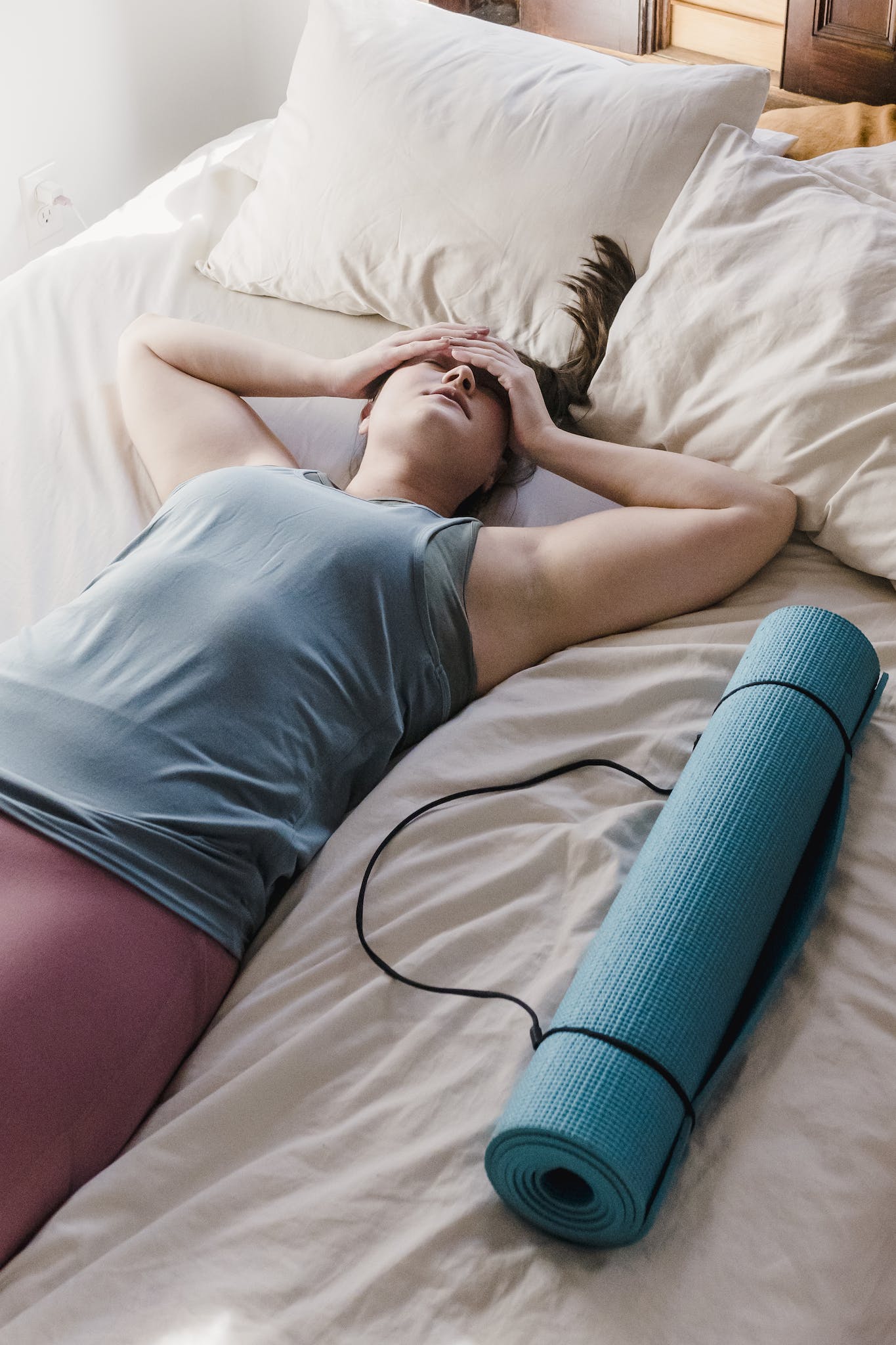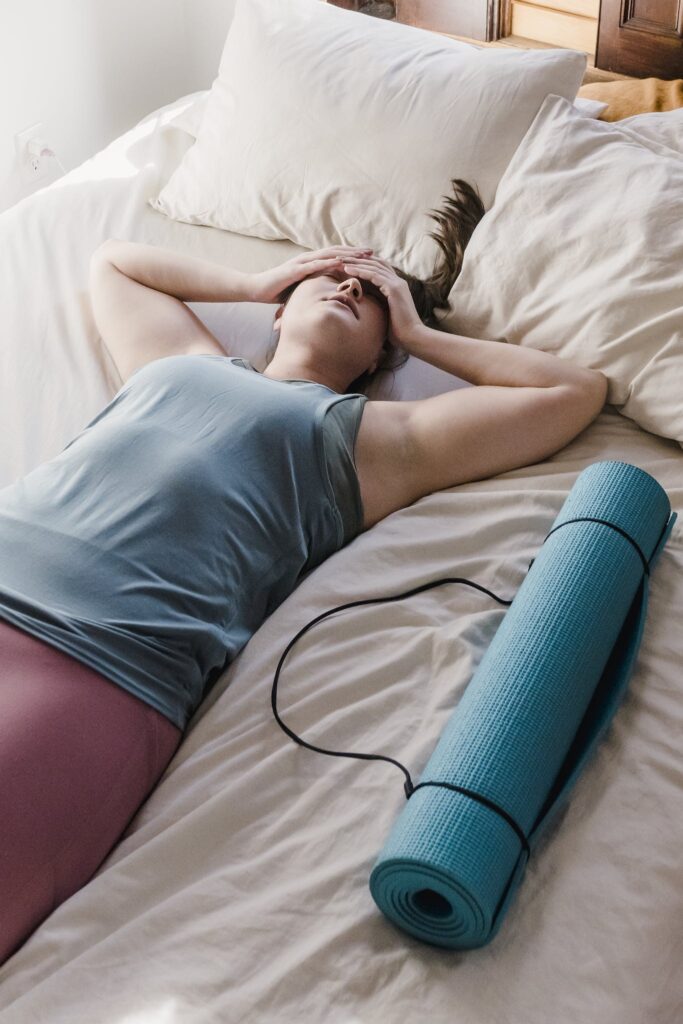How Exercise Improves Your Sleep Quality and Quantity

2. The Science Behind the Connection

Physical activity and sleep have been closely connected for centuries, with individuals reporting improved sleep after engaging in exercise. However, the science behind this connection goes beyond mere anecdotal evidence. Research has shown that exercise can directly influence sleep patterns and promote better quality rest.
One of the key mechanisms by which exercise impacts sleep is through the regulation of the body’s circadian rhythm. The circadian rhythm is the internal body clock that controls various physiological processes, including sleep-wake cycles. Regular physical activity helps synchronize this clock, allowing individuals to fall asleep faster and experience deeper, more restorative sleep. Additionally, exercise has been shown to increase the production of endorphins, neurotransmitters that promote feelings of relaxation and well-being, further facilitating a better night’s sleep.
Furthermore, exercise has direct effects on the body’s temperature regulation system. During physical activity, body temperature rises, and post-exercise, it gradually declines. This drop in body temperature signals the body to initiate sleep. Therefore, individuals who engage in regular exercise tend to experience quicker onset and higher quality sleep due to this natural temperature shift.
Overall, the scientific evidence supports the close relationship between exercise and sleep. By influencing the circadian rhythm and body temperature regulation, physical activity promotes enhanced sleep patterns and overall sleep quality. Understanding the science behind this connection allows individuals to harness the benefits of exercise for optimal sleep.
3. The Role of Physical Activity in Regulating Sleep Patterns

Physical activity plays a crucial role in regulating sleep patterns. Engaging in regular exercise has been shown to have a positive impact on the quantity and quality of sleep. Studies have found that individuals who are physically active tend to fall asleep faster, experience fewer disruptions during the night, and wake up feeling more rested and refreshed.
One way in which physical activity aids in sleep regulation is by helping to align our internal body clock, also known as the circadian rhythm. Regular exercise during the day promotes the release of cortisol, a hormone that helps us stay alert and awake. By exposing ourselves to natural light and physical activity during daylight hours, we signal to our body that it is indeed daytime, reinforcing our wakefulness. This, in turn, makes it easier for us to wind down and fall asleep in the evening, as our body recognizes the shift towards nighttime and produces the sleep-inducing hormone melatonin.
4. The Benefits of Regular Exercise on Sleep Quality

Regular exercise has been shown to have numerous benefits on sleep quality. One of the key ways in which exercise can improve sleep is by reducing the time it takes to fall asleep, also known as sleep onset latency. Engaging in regular physical activity can help to tire out the body and prepare it for a restful night’s sleep. Additionally, exercise has been found to increase the duration of deep sleep, also known as slow-wave sleep, which is the stage of sleep associated with physical restoration and rejuvenation.
Exercise can also have a positive impact on sleep disorders, such as insomnia. Studies have shown that incorporating aerobic exercise into one’s routine can significantly reduce the severity of insomnia symptoms and improve overall sleep quality. This is thought to be due to the release of endorphins during exercise, which can help to reduce anxiety and promote relaxation. Incorporating regular exercise into one’s routine may therefore be a valuable non-pharmaceutical approach for managing insomnia symptoms.
5. How Exercise Can Help Reduce Insomnia Symptoms
Insomnia is a common sleep disorder that affects millions of people worldwide. It is characterized by difficulty falling asleep, staying asleep, or a combination of both. The impact of insomnia can be profound, leading to daytime fatigue, mood disturbances, and decreased cognitive function. However, there is growing evidence suggesting that exercise can play a crucial role in reducing insomnia symptoms.
Regular exercise has been shown to improve sleep quality and reduce the severity of insomnia symptoms. Engaging in physical activity can help regulate the body’s circadian rhythm, the internal biological clock that controls sleep-wake cycles. Studies have indicated that exercise can increase the production of serotonin, a neurotransmitter that promotes relaxation and helps regulate sleep. Additionally, exercise has been found to reduce levels of cortisol, a stress hormone that can interfere with sleep patterns. These physiological changes brought about by regular exercise can contribute to improved sleep efficiency and a reduction in the time it takes to fall asleep.
In addition to its direct effects on sleep patterns, exercise can also help alleviate other factors contributing to insomnia. For instance, engaging in physical activity can reduce anxiety and depression, which are commonly associated with sleep disturbances. Exercise has been shown to increase the production of endorphins, the brain’s natural feel-good chemicals, leading to improvements in mood and overall well-being. By addressing these underlying psychological factors, exercise can have a positive impact on sleep quality and insomnia symptoms.
Try out this yoga for sleep technique and share your experience in the comments:
6. The Influence of Exercise on Sleep Disorders, such as Sleep Apnea
Sleep disorders, such as sleep apnea, can significantly disrupt a person’s sleep patterns and overall well-being. Sleep apnea is a condition characterized by pauses in breathing or shallow breathing during sleep, leading to fragmented sleep and excessive daytime sleepiness. The influence of exercise on sleep disorders like sleep apnea has been a topic of interest among researchers.
Engaging in regular physical activity has shown promise in improving sleep quality and reducing the severity of sleep apnea symptoms. Exercise can help by enhancing cardiovascular fitness and improving respiratory function, which are often impaired in individuals with sleep apnea. Additionally, exercise can aid in weight loss or weight management, as excess weight is a common risk factor for sleep apnea. Shedding excess pounds through exercise can alleviate the strain on the airways, potentially reducing the frequency and severity of breathing interruptions during sleep.
Several studies have demonstrated the positive effects of exercise on sleep disorders, particularly sleep apnea. A randomized controlled trial conducted by Kline et al. (2011) found that participants with moderate to severe sleep apnea who engaged in an aerobic exercise program experienced significant improvements in both sleep quality and daytime sleepiness compared to a control group. Another study by Kline et al. (2015) showed that individuals with sleep apnea who combined aerobic exercise with resistance training experienced greater improvements in cardiometabolic health markers and sleep apnea severity compared to those who only participated in aerobic exercise. These findings highlight the potential benefits of incorporating exercise into the management of sleep disorders like sleep apnea.
7. The Effect of Exercise Timing on Sleep Quality and Quantity
Regular exercise has been found to have a positive impact on sleep quality and quantity. However, the timing of exercise can also play a role in determining its effect on sleep. Research suggests that engaging in exercise close to bedtime may have a negative impact on sleep quality and make it more difficult to fall asleep.
One study published in the journal Sleep Medicine found that participants who exercised within one hour before bedtime experienced prolonged sleep onset latency, which refers to the amount of time it takes to fall asleep. The study suggests that the physiological arousal caused by exercise may interfere with the body’s ability to transition into a state of relaxation and sleep. Additionally, exercising close to bedtime can increase core body temperature, which can also make it more challenging to fall asleep.
It is important to note that the effect of exercise timing on sleep can vary from person to person. Some individuals may be more sensitive to the stimulating effects of exercise and may find it more difficult to wind down and relax after a late workout. On the other hand, others may not experience any negative effects on sleep quality. Understanding one’s own response to exercise timing can help individuals make informed decisions about when to engage in physical activity to optimize their sleep.
8. Finding the Right Exercise Routine for Better Sleep

Exercise has been shown to have numerous benefits for sleep quality and duration. However, in order to maximize these benefits, it is important to find the right exercise routine that works best for you. Every individual is different, and what works for one person may not work for another. Therefore, it is crucial to experiment and find the exercise routine that suits your body and preferences.
When it comes to finding the right exercise routine for better sleep, one important factor to consider is the timing of your workouts. It has been found that exercising too close to bedtime can actually interfere with sleep. This is because exercise raises your body temperature and stimulates your body, making it more difficult to wind down and fall asleep. Therefore, it is recommended to finish your workout at least a few hours before bedtime to allow your body to cool down and relax. On the other hand, exercising in the morning or early afternoon has been shown to have positive effects on sleep, as it helps regulate your circadian rhythm and promotes wakefulness during the day. Finding the optimal timing for your exercise routine can greatly contribute to improving your sleep quality.
In addition to timing, the type of exercise you engage in also plays a role in its impact on sleep. Different forms of exercise have different effects on the body. For example, aerobic exercises, such as running or swimming, have been shown to have positive effects on sleep, as they increase the amount of deep sleep and reduce the time it takes to fall asleep. On the other hand, high-intensity exercises, such as weightlifting or intense cardio workouts, may have a more stimulating effect on the body, making it more difficult to fall asleep. Therefore, it is important to choose exercises that are enjoyable for you and promote relaxation, such as gentle yoga or light stretching, especially in the evening hours. Experimenting with different types of exercise and listening to your body’s response can help you find the right routine that enhances your sleep quality.
9. The Importance of Consistency in Exercise for Optimal Sleep
Exercise has long been recognized as a key factor in promoting overall health and well-being, and its benefits extend beyond physical fitness. When it comes to sleep, consistency in exercise plays a crucial role in achieving optimal sleep quality. Numerous studies have highlighted the positive impact of regular exercise on sleep duration, efficiency, and overall sleep satisfaction.
One of the key reasons why consistency in exercise is essential for optimal sleep is its effect on the body’s internal clock, also known as the circadian rhythm. Engaging in physical activity at the same time each day helps regulate this biological clock, ensuring that our sleep-wake cycle stays aligned with natural rhythms. This consistency signals to our body when it’s time to wind down and prepare for restful sleep. Moreover, sticking to a regular exercise routine can help minimize disruptions to the circadian rhythm, enhancing the overall quality of sleep.
Here’s information on the importance of consistency in exercise for optimal sleep:
| Importance of Consistency in Exercise for Optimal Sleep | Key Concepts and Considerations | Credible Source |
|---|---|---|
| Regulation of Circadian Rhythms | Regular exercise aligns with the natural sleep-wake cycle. | National Sleep Foundation |
| Enhanced Sleep Quality | Consistent exercise is linked to improved sleep quality. | Sleep Medicine Reviews |
| Reduction in Sleep Onset Latency | Regular exercise promotes quicker sleep onset. | Journal of Sleep Research |
| Management of Insomnia Symptoms | Exercise helps alleviate symptoms of insomnia. | Sleep Medicine Reviews |
| Stabilization of Sleep Patterns | Consistent exercise contributes to stable sleep patterns. | [Various Studies] |
10. Enhancing Sleep Efficiency through Exercise
Regular exercise has been shown to have a positive impact on sleep efficiency, which refers to the quality and duration of sleep. Engaging in physical activity can help individuals fall asleep faster, achieve deeper sleep stages, and reduce the frequency of sleep disturbances. This is particularly beneficial for individuals who struggle with insomnia or other sleep disorders.
One way in which exercise enhances sleep efficiency is by increasing the body’s temperature. During exercise, the body experiences a temporary rise in temperature, which is followed by a decrease in temperature once exercise is completed. This post-exercise drop in temperature signals the body that it is time to sleep, as it mimics the natural cooling process that occurs during the evening. Additionally, exercise promotes the release of endorphins, which are known to elevate mood and reduce stress. By reducing anxiety and promoting relaxation, exercise can contribute to a more restful and rejuvenating sleep experience.
11. Combining Different Types of Exercise for Improved Sleep
Combining different types of exercise can be a highly effective strategy for improving sleep quality. By engaging in a variety of physical activities, individuals can target different aspects of their overall health and enhance their sleep-wake cycle.
When it comes to combining exercises for better sleep, it is important to include both aerobic and strength-training exercises in your routine. Aerobic exercises, such as running, swimming, or cycling, have been shown to improve sleep quality by increasing overall physical fitness and reducing stress levels. On the other hand, strength-training exercises, like weightlifting or resistance training, can help promote muscle growth and maintenance, which plays a crucial role in supporting a healthy sleep pattern.
By incorporating both aerobic and strength-training exercises into your routine, you can achieve a well-rounded approach to improving sleep. Aim for at least 150 minutes of moderate-intensity aerobic exercise per week, along with two or more sessions of strength training. However, it’s important to consult with a healthcare professional before starting any new exercise program, especially if you have any underlying health conditions.
12. The Relationship Between Exercise Intensity and Sleep Benefits
Exercise intensity plays a crucial role in determining the sleep benefits one can experience. Several studies have shown that higher-intensity exercise tends to have a more significant positive impact on sleep compared to lower-intensity activities. The reason behind this lies in the physiological changes that occur during intense exercise. When engaging in high-intensity workouts, the body increases its production of endorphins and adrenaline, which not only boost mood and energy levels but also contribute to a deeper and more restorative sleep. Additionally, intense exercise stimulates the release of growth hormone, which is essential for muscle repair and recovery, and has been linked to better sleep quality.
It is important to note that the intensity of exercise should be tailored to individual fitness levels and capabilities. Pushing oneself too hard without proper training or conditioning can increase the risk of injuries and hinder sleep quality. Finding the right balance is key. Gradually increasing the intensity of workouts over time and incorporating a mix of different exercise modalities such as cardio, strength training, and interval training can help optimize sleep benefits. Consulting with a qualified fitness professional can provide valuable guidance in designing an exercise routine that suits individual needs and goals. By carefully considering exercise intensity, one can harness the full potential of physical activity in improving sleep quality and overall well-being.
13. Tips for Incorporating Exercise into Your Daily Routine for Better Sleep
Regular exercise is not only beneficial for physical health but also plays a vital role in improving sleep quality. If you’re looking to incorporate exercise into your daily routine to enhance your sleep, here are some tips to help you get started.
1. Set realistic goals: Begin by setting achievable exercise goals that align with your fitness level and schedule. Aim for at least 150 minutes of moderate-intensity aerobic activity or 75 minutes of vigorous-intensity exercise each week, as recommended by the American Heart Association.
2. Find activities you enjoy: It’s easier to stick to an exercise routine if you genuinely enjoy the activities you engage in. Whether it’s swimming, cycling, dancing, or hiking, choose activities that bring you joy and make you more likely to continue exercising regularly.
3. Optimize timing: The timing of exercise can significantly impact your sleep. Try to schedule your workout sessions earlier in the day, preferably in the late afternoon or early evening. Engaging in vigorous exercise too close to bedtime may leave you feeling energized, making it harder for you to fall asleep.
4. Create a routine: Consistency is key when it comes to incorporating exercise into your daily routine. Establish specific times for your workouts and make an effort to stick to them. By making exercise a regular part of your day, you’ll begin to develop a habit that promotes better sleep.
5. Listen to your body: Pay attention to how your body responds to exercise. If you experience any pain or discomfort, adjust your routine or consult with a healthcare professional. It’s essential to find a balance between challenging yourself and avoiding overexertion, as your overall well-being is crucial.
By following these tips, you can gradually integrate exercise into your daily routine and experience the sleep-enhancing benefits it offers. Remember to consult with your healthcare provider before starting any new exercise program, especially if you have any underlying medical conditions.
Please note that this list is a recommended structure for your blog post, and you can adjust or expand each section as needed to provide a comprehensive coverage of the topic.
The structure provided for this blog post serves as a comprehensive outline to explore the various aspects of the connection between exercise and sleep. While each section has its own unique focus, it is important to note that the order and length of each section can be customized to suit the needs of the article. By adjusting and expanding upon these sections, readers will gain a more thorough understanding of the science behind this connection and how exercise can positively impact sleep.
Within this article, we will delve into the role of physical activity in regulating sleep patterns. Research has shown that engaging in regular exercise can help regulate the body’s circadian rhythm, which is essential for a healthy sleep-wake cycle. Furthermore, we will explore the benefits that regular exercise brings to sleep quality. Studies have revealed that individuals who engage in consistent physical activity often experience improved sleep duration and a reduction in sleep disturbances. By examining these topics, we can uncover the ways in which exercise can positively influence sleep patterns and overall sleep quality.
What is the science behind the connection between exercise and sleep?
Exercise has been found to have a positive impact on sleep due to its effect on the body’s stress response system, hormone regulation, and body temperature.
How does physical activity regulate sleep patterns?
Physical activity helps regulate sleep patterns by promoting the release of endorphins, reducing stress and anxiety, and increasing body temperature, which can aid in falling asleep faster and achieving a deeper sleep.
What are the benefits of regular exercise on sleep quality?
Regular exercise can improve sleep quality by promoting longer and deeper periods of sleep, reducing the time it takes to fall asleep, and decreasing the amount of wakefulness during the night.
Can exercise help reduce insomnia symptoms?
Yes, exercise has been shown to be an effective natural remedy for insomnia. It can help regulate sleep-wake cycles, reduce anxiety and stress, and improve overall sleep quality.
How does exercise influence sleep disorders like sleep apnea?
Exercise can be beneficial for sleep disorders like sleep apnea as it helps strengthen the muscles involved in breathing, aids in weight management, and improves overall cardiovascular health, which can alleviate symptoms and improve sleep quality.
Does the timing of exercise affect sleep quality and quantity?
Yes, the timing of exercise can impact sleep quality and quantity. Exercising too close to bedtime may increase alertness and make it harder to fall asleep, while exercising earlier in the day can promote better sleep.
How can I find the right exercise routine for better sleep?
Finding the right exercise routine for better sleep involves experimenting with different types of exercises, considering personal preferences and physical abilities, and finding a balance between cardiovascular exercise and relaxation-based activities like yoga or stretching.
How important is consistency in exercise for optimal sleep?
Consistency in exercise is crucial for optimal sleep. Regular exercise helps regulate the body’s internal clock, improves sleep quality, and promotes a consistent sleep schedule.
How can exercise enhance sleep efficiency?
Exercise can enhance sleep efficiency by reducing the time it takes to fall asleep, increasing the amount of time spent in deep sleep, and minimizing sleep disturbances throughout the night.
Is combining different types of exercise beneficial for improved sleep?
Yes, combining different types of exercise can be beneficial for improved sleep. Incorporating both aerobic exercises and relaxation-based activities can help promote better sleep quality and overall sleep health.
What is the relationship between exercise intensity and sleep benefits?
The relationship between exercise intensity and sleep benefits is complex. Moderate-intensity exercise has been shown to have the most positive impact on sleep, but it’s important to find a balance that suits individual fitness levels and preferences.
What are some tips for incorporating exercise into my daily routine for better sleep?
Some tips for incorporating exercise into your daily routine for better sleep include setting realistic goals, finding activities you enjoy, scheduling exercise at least a few hours before bedtime, and gradually increasing the duration and intensity of your workouts.
Please note that this list is a recommended structure for your blog post, and you can adjust or expand each section as needed to provide a comprehensive coverage of the topic.






